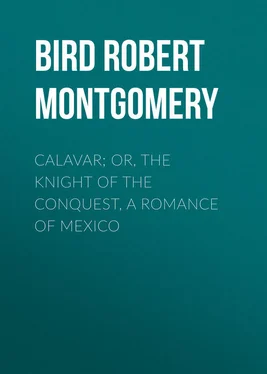Robert Bird - Calavar; or, The Knight of The Conquest, A Romance of Mexico
Здесь есть возможность читать онлайн «Robert Bird - Calavar; or, The Knight of The Conquest, A Romance of Mexico» — ознакомительный отрывок электронной книги совершенно бесплатно, а после прочтения отрывка купить полную версию. В некоторых случаях можно слушать аудио, скачать через торрент в формате fb2 и присутствует краткое содержание. Жанр: foreign_antique, foreign_prose, Историческая проза, на английском языке. Описание произведения, (предисловие) а так же отзывы посетителей доступны на портале библиотеки ЛибКат.
- Название:Calavar; or, The Knight of The Conquest, A Romance of Mexico
- Автор:
- Жанр:
- Год:неизвестен
- ISBN:нет данных
- Рейтинг книги:5 / 5. Голосов: 1
-
Избранное:Добавить в избранное
- Отзывы:
-
Ваша оценка:
- 100
- 1
- 2
- 3
- 4
- 5
Calavar; or, The Knight of The Conquest, A Romance of Mexico: краткое содержание, описание и аннотация
Предлагаем к чтению аннотацию, описание, краткое содержание или предисловие (зависит от того, что написал сам автор книги «Calavar; or, The Knight of The Conquest, A Romance of Mexico»). Если вы не нашли необходимую информацию о книге — напишите в комментариях, мы постараемся отыскать её.
Calavar; or, The Knight of The Conquest, A Romance of Mexico — читать онлайн ознакомительный отрывок
Ниже представлен текст книги, разбитый по страницам. Система сохранения места последней прочитанной страницы, позволяет с удобством читать онлайн бесплатно книгу «Calavar; or, The Knight of The Conquest, A Romance of Mexico», без необходимости каждый раз заново искать на чём Вы остановились. Поставьте закладку, и сможете в любой момент перейти на страницу, на которой закончили чтение.
Интервал:
Закладка:
How many days and nights were given to the examination of the history, we do not think fit to record. It is enough, that the inheritor of this treasure discovered with satisfaction, that, if Cristobal had been mad, he had been mad after a rule, – dramatically so: he was sane in the right places. A thousand eccentricities were, indeed, imbodied in his work, the result, doubtless, of a single aberration, in which he persuaded himself that men were yet barbarians, and that civilization, even to the foremost of nations, was yet unknown. Under the influence of this conceit, he was constantly betrayed, for he was a philanthropist, into sharp animadversion upon popular morals; and he stigmatized as vices of the most brutal character, many of those human peculiarities which the world has consented to esteem the highest virtues. In other respects, he was sane, somewhat judicious, and, as far as could be expected in an historian, a teller of the truth.
His work consisted of several divisions; it was, in fact, a series of annals, relating to different epochs. Of these, that volume which treated of the Conquest of Mexico, had the most charms for the traveller; and he thought it would possess the most interest for the world. It was this which he determined to introduce to the public. It differed greatly from common histories in one particular; it descended to minutiæ of personal adventure, and was, indeed, as much a general memoir of the great Conquistadores as a history of the fall of Tenochtitlan. Of this the writer was himself sensible; the running title of the division, as recorded in his own hand, being, " Una Cronica de la Conquista de Megico, y Historia verdadera de los Conquistadores, particularmente de esos Caballeros á quienes descuidaron celebrar los Escritores Antiguos . Por Cristobal Johualicahuatzin Santiago Marhojo y Ixtlilxochitl ;" – that is to say, 'A Chronicle of the Conquest of Mexico, and true History of the Conquerors, especially of those Cavaliers who were neglected by the ancient authors.'
The first portion of this, – for there were several, – treated of those events which occurred between the departure of the first army of invasion from Cuba, and its expulsion from Mexico, and this portion the executor of Cristobal resolved to present to the world.
In pursuance of this resolution, he instituted a long and laborious comparison of the MS. with the most authentic printed histories; the result of which was a conviction, (which we beg the reader constantly to bear in mind,) that, although the good padre had introduced, and upon authority which his editor could not discover, the characters of certain worthy cavaliers, of whom he had never heard, the relation, in all other particulars, corresponded precisely with the narratives of the most esteemed writers. The events – the great and the minute alike – of the whole campaign were, in point of fact, identical with those chronicled by the best authors; and in no way did this history differ from others, except in the introduction of the above-mentioned forgotten or neglected cavaliers, such as the knight of Calavar and his faithful esquire, and in the recital of events strictly personal to them. It is true, the narrative was more diffuse, perhaps we should say, verbose; but Cristobal lived in an age of amplification. It was here alone that the traveller felt himself bound to take liberties with the original; for though the march of mind and the general augmentation of ideas, have made prolixity a common characteristic of each man in his own person, they have not made him more tolerant of it in another. He shaved, therefore, and he cut, he amputated and he compressed; and he felt the joy of an editor, when exercising the hydraulic press of the mind.
This will be excused in him. He expunged as much of the philosophy as he could. The few principles at variance with worldly propensities, which he left in the book, must be referred to another responsibility. – The hallucinations of philanthropy are, at the worst, harmless.
For the title adopted in this, the initial chronicle, he confesses himself answerable. The peculiar appetites of the literary community, the result of intellectual dyspepsia, require and justify empiricism in nomenclature. A good name is sugar and sweetmeats to a bad book. If it should be objected, that he has called the Historia Verdadera a romance, let it be remembered, that the world likes romance better than truth, as the booksellers can testify; and that the history of Mexico, under all aspects but that of fiction, is itself – a romance.
Note. – It was said by the learned Scaliger, of the Basque language, 'that those who spoke it were thought to understand one another, – a thing which he did not himself believe.' For fear that the reader, from the specimens of Mexican words he will meet in this history, should imagine that the Mexican tongue was not meant even to be spoken , we think fit to apprise him, that all such words are to be pronounced as they would be uttered by a Spaniard. In his language, for example, the G, when before the vowels E and I, the J always, and, in certain cases, the X, have the value of the aspirate. Thus, the name of the city, the chief scene of our history, has been spelled, at different times, Mexico , Mejico , and Megico ; yet is always pronounced May-he-co . The sound of our W he represents by HU, – as Huascar , for Wascar; and, indeed, JU has nearly the same sound, as in Juan . The names Johualicahuatzin, Anahuac, Xocojotzin, Mexitli, and Chihuahua, pronounced Howalicawatzin, Anawac, Hocohotzin, Meheetlee, and Chewawa, will serve for examples. But this is a thing not to be insisted on, so much as the degree of belief which should be accorded to the relation.
Esto importa poco á nuestro cuento: basta que en la narracion de el, no se salga un punto de la verdad. — Don Quijote.
CHAPTER I
In the year of Grace fifteen hundred and twenty, upon a day in the month of May thereof, the sun rose over the islands of the new deep, and the mountains that divided it from an ocean yet unknown, and looked upon the havoc, which, in the name of God, a Christian people were working upon the loveliest of his regions. He had seen, in the revolution of a day, the strange transformations which a few years had brought upon all the climes and races of his love. The standard of Portugal waved from the minarets of the east; a Portuguese admiral swept the Persian Gulf, and bombarded the walls of Ormuz; a Portuguese viceroy held his court on the shores of the Indian ocean; the princes of the eastern continent had exchanged their bracelets of gold for the iron fetters of the invader; and among the odours of the Spice Islands, the fumes of frankincense ascended to the God of their new masters. He passed on his course: the breakers that dashed upon the sands of Africa, were not whiter than the squadrons that rolled among them; the chapel was built on the shore, and under the shadow of the crucifix was fastened the first rivet in the slavery of her miserable children. Then rose he over the blue Atlantic: the new continent emerged from the dusky deep; the ships of discoverers were penetrating its estuaries and straits, from the Isles of Fire even to the frozen promontories of Labrador; and the roar of cannon went up to heaven, mingled with the groans and blood of naked savages. But peace had descended upon the islands of America; the gentle tribes of these paradises of ocean wept in subjection over the graves of more than half their race; hamlets and cities were springing up in their valleys and on their coasts; the culverin bellowed from the fortress, the bell pealed from the monastery; and the civilization and vices of Europe had supplanted the barbarism and innocence of the feeble native. Still, as he careered to the west, new spectacles were displayed before him; the followers of Balboa had built a proud city on the shores, and were launching their hasty barks on the surges of the New Ocean; the hunter of the Fountain of Youth was perishing under the arrows of the wild warriors of Florida, and armed Spaniards were at last retreating before a pagan multitude. One more sight of pomp and of grief awaited him: he rose on the mountains of Mexico; the trumpet of the Spaniards echoed among the peaks; he looked upon the bay of Ulua, and, as his beams stole tremblingly over the swelling current, they fell upon the black hulls and furled canvas of a great fleet riding tranquilly at its moorings. The fate of Mexico was in the scales of destiny; the second army of invaders had been poured upon her shores. In truth, it was a goodly sight to look upon the armed vessels that thronged this unfrequented bay; for peacefully and majestically they slept on the tide, and as the morning hymn of the mariners swelled faintly on the air, one would have thought they bore with them to the heathen the tidings of great joy, and the good-will and grace of their divine faith, instead of the earthly passions which were to cover the land with lamentation and death.
Читать дальшеИнтервал:
Закладка:
Похожие книги на «Calavar; or, The Knight of The Conquest, A Romance of Mexico»
Представляем Вашему вниманию похожие книги на «Calavar; or, The Knight of The Conquest, A Romance of Mexico» списком для выбора. Мы отобрали схожую по названию и смыслу литературу в надежде предоставить читателям больше вариантов отыскать новые, интересные, ещё непрочитанные произведения.
Обсуждение, отзывы о книге «Calavar; or, The Knight of The Conquest, A Romance of Mexico» и просто собственные мнения читателей. Оставьте ваши комментарии, напишите, что Вы думаете о произведении, его смысле или главных героях. Укажите что конкретно понравилось, а что нет, и почему Вы так считаете.












